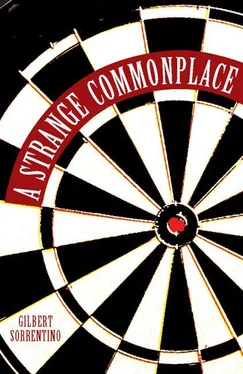RAY AND HIS OLDER BROTHER, WARREN, SHARED EVERYthing. That’s the kind of hairpins they were, as Warren liked to say, using an expression employed by Jimmy Cagney in Strawberry Blonde, a quiet, oddly dark movie, in which he plays a dentist, or perhaps a barber. Although the movie is intended to be sunny, there is a persistent sadness to its story. The great Jack Carson is Jimmy’s nemesis, and, oddly enough, both Ray and Warren reminded me of him in many of the roles he inhabited. They both flaunted a blustery, friendly, yet oily charm, a kind of nervous, blunt manliness that is endemic among American men. Both brothers married fairly late in life and both had children: Warren, a daughter, whose name I forget, a beautiful child who became a beautiful woman. Ray had two children, a daughter, who died in an automobile accident in Sheepshead Bay at the age of twenty-three; and a son who joined the Marine Corps and simply cut off all connections with his family, such as it was, to live, as Ray took absurd and wistful pleasure in calling “a real life for a real man.” Warren was a greengrocer and earned a good living, although his wife complained that he “worked like a nigger,” and Ray became a credit investigator for Dun & Bradstreet, invested wisely, as they say, became a Republican as soon as he had established a modest portfolio (and how Warren loved to edge that phrase with venom whenever he spoke of his “tycoon” brother). They had, of course, stopped sharing. Warren was relieved when his wife died, for she had begun to scorn him, hate him, really, for reasons that she never disclosed to anyone. He decided to stay in the same small apartment in which the family had lived for years, and he kept a bedroom ready for his daughter should she decide to stop living what he called her wild life; but she never came home to live with him, nor, for that matter, did she ever visit or even call him. Ray once mentioned that she’d become pregnant by some guinea bastard truck driver, but, thank God, miscarried, no doubt because of her drinking and carrying on with any son of a bitch with a phony smile, a few bucks, and a car. Her father seemed to agree with him, although the brothers had grown distant, to say the least, over the years, and when Warren died, some six months after his daughter’s premature death, Ray sent a floral spray to the funeral home, but attended neither the wake nor the burial. The sateen sash across the arrangement read, in glistening gold letters on a dark red field, OLD HAIRPIN, bewildering the mourners, who were few indeed. Ray, a widower soon after Warren’s death, was found one day dead in his shabby apartment, sitting in a battered, sprung easy chair in his pajamas and overcoat, a stained homburg on his head and an unopened pack of Lucky Strikes on his lap. He had died intestate, and after probate settlement and taxes and surrogate’s court fees, his son, Warren, a gunnery sergeant with almost thirty years in the Corps, got about $240,000. Warren had never married, so this money and his military pension most probably assured him a comfortable retirement in Oldsmar, Florida, a Tampa suburb which, or so I understand, is a pleasant enough town.
SHE DECIDED TO LEAVE THE LITTLE PARTY AND HER husband and a lot of friends she’d known for years to their drinking and flirting and groping and give herself over to this unkempt man whose kinky red hair was dull with dirt and oil. She’d seen him many times in downtown bars, always seedy, always with a superior, slightly mocking smile on his face, always with a battered black spring binder, crammed with tattered papers, held closely against his side. He smelled faintly of fish. When they got off the elevator and reached the street, he put his fingers to his mouth and whistled once, the sound producing, from a small areaway across the street, a young black man with the face of a regularly battered prize fighter. He was dressed in an expensive dark suit that needed cleaning and pressing, and the collar of his white shirt was black with filth. The men nodded at each other and she smiled and said “hello” to the black man in an absurdly cheery tone. The men flanked her and they walked quickly down the block, then abruptly turned into the hallway of an old walk-up, where she was decisively steered up three cracked and stained marble steps and through an unlocked door into a little airless vestibule lit by one amber lightbulb that revealed a crusted and worn maroon carpet, on which were centered a wicker table with a smudged and sticky glass top and two matching chairs. The men stepped back and looked at her, and the black man made an impatient gesture toward her belly, while the white man put his spring binder on the table. She looked away from them, then carefully, modestly, reached under her skirt and pulled her panties down and then off, easing them past her high heels. She put them on top of the spring binder, turned her back on the men, and bent over the table, complaisant, settling her forearms on its surface. She closed her eyes as she felt hands pushing up her skirt and slip to her waist. It struck her suddenly as strange that this building should be so shabby and uncared for on this very nice block so close to the park. One of the men was in her and she gasped.
SOME STRANGE MAN WAS GIVING IT TO HER FROM BEHIND and anybody could walk into the hallway and see them there. She was too drunk and drugged to understand much, and maybe they were in a bathroom. The black-and-white tile floor appeared to slide and shift on either side of her shoes; they were clean tiles. Her husband was with some slut half his age at the party, maybe, and turnabout is only something. Baby, baby, oh baby, the man whispered, and she could feel him coming. Here, he said, a long time later, handing her a wad of tissues. But what was her husband doing here and where was the man? Clean yourself, he said, and let me fix your face, Christ almighty, you are a wreck. What was her husband doing here and where was the man? She told her husband that the man said he was only trying to help her. He said. She thought she was going to be sick and he said he’d help her here, to the bathroom, and she was sorry. She was sorry. He looked carefully at her face, wiping smeared lipstick from the corners of her mouth and upper lip, blotting gently the half-dried tears on her cheeks. He shook his head and smiled a little. He had no idea what man she was talking about, but he was sure that writer bastard gave her something more than a drink. She realized that she wasn’t wearing any underwear, but she had her hat and scarf on. What was her husband doing here and where was the man? Maybe he hadn’t even seen the man, please, please, maybe that’s it, he hadn’t even seen the man! She’d just keep her mouth shut, yes. She suddenly half turned and, bent slightly from the waist, threw up into the bathtub. She was terribly ashamed.
THE BOY WAS IN THE BACKYARD, PLAYING AIMLESSLY IN the thin snow that covered the packed soil in which nothing had ever been planted. She looked out of one of the panes in the back door window at him, waiting. There he goes. He bent down and untied first one shoelace, then the other, straightened up, and headed toward the wooden stairs that led to the little back porch. She stepped away from the door, feeling a cold and gray sadness, near despair. He opened the door and stood there, a little dull animal, the wet March air coming into the kitchen. My shoes came open, Mama. She knelt down and tied them and he went out again, closing the door. The sky was turning livid as the pale, silvery sun went down. She put a bottle of Worcestershire sauce on the table, poured the sweet, orange, bottled dressing on the lettuce, tomato, and cucumber salad, and tossed it, then set the table for three. It was about time for him to get home but she knew that he wouldn’t be home till midnight. Or maybe not till the morning. She arranged sliced roast fresh ham, bologna, spiced ham, and Swiss cheese on a plate, next to which she placed a jar of mayonnaise and one of mustard, and a loaf of Silvercup. She put the Worcestershire back in the cupboard, took down an almost full quart of Wilson’s, and poured herself a water glass full, drinking it in three long swallows. She gagged and her eyes teared, but she stood still and held her arms rigid at her sides and was all right. Then she went upstairs to their bedroom, that’s a laugh. He hadn’t done it with her in more than a month and a half, and that last time his undershirt smelled of Evening in Paris. She pulled off her housecoat and brushed her hair, washed her face, then put in a pair of onyx-and-gold earrings. She undressed and put on her best underwear and silk stockings, gartering them carefully so that they’d be taut, without those dowdy little wrinkles at the ankles. She applied pale-red lipstick and just a touch of rouge, then a little powder. She stepped into a tight black dress that had faint gold threads running vertically from just beneath the bodice to the hem of the skirt, and put on a black felt hat with a small snap brim. Not bad. She pulled her remodeled gray Persian lamb coat over her shoulders, slipped on her new black pumps, then danced around the room, humming “Poor Butterfly.” She abruptly stopped, took her handbag, and went downstairs. She could feel the whiskey, her lips slightly numb, her belly warm, a vague prickling in her loins. She couldn’t do it any more, she could not do it any any any more. She’d have another drink. She looked out at the backyard in time to see the boy plodding toward the house, his shoelaces dragging. Oh Jesus, oh Jesus Mary and Joseph. She drank off the whiskey and felt it blaze into her head in a rush. The kitchen looked bright, clear, the weird orange dressing on the salad cheery, everything looked wonderful. That’s good. That would be very good. She took twenty-three dollars in fives and singles from Joy of Cooking that her battle-ax mother-in-law had given her as a hint, the old bitch, and put the money in her bag, then locked the back door just as the boy was turning the knob. She looked out at him, standing in the near-darkness, mucus running down his upper lip from both nostrils, his face blank and stupid, yet resolute, determined. He tried the knob again and again, a robot. She couldn’t do this any more. She walked through the house, knocking the black teapot with the disgusting dragon on it to the floor: a bad-luck gift, an evil-eye gift from her mother on their first anniversary. She heard it break and smiled, then staggered and almost lost her balance. She opened the front door to walk, very carefully, down the three brick steps to the street, those wonderful brick steps. She could go anywhere, she’d get another drink in someplace respectable where ladies were not allowed at the bar but were welcome in the tap room, in the restaurant. She still looked good at thirty-two, and she could do whatever she wanted to do. She was free, white, and twenty-one, and had always been full of fun. Everybody said so.
Читать дальше











